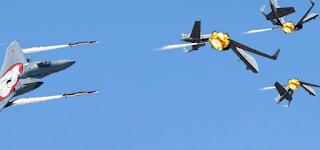Neither China nor the united states
wants war at least not in the near
future. China's military buildup notwithstanding. The people's liberation army (PLA) and its
components are not ready to fight the
united states. The U.S for its part would surely prefer
to avoid the chaos and uncertainty that
any military conflict with china would
create.
Nevertheless both china and the united
states are making commitments in the
south china sea that each may find
difficult to back away from. Over the past two weeks these
commitments have generated a war of
words that analysts of the relationship
have found troubling. The key problems focus on China's
efforts to expand or create islands in
the spratlys which could theoretically
provide the basis for claims to
territorial waters. The insistence of the United States on
freedom of navigation could bring these
tensions to a boil, here are three ways in which tensions in
the south china sea might lead to
conflict.
Over the past several months China has
stepped up construction of what
observers are calling the great wall of
sand, this great wall involves expanding
a group of islands in the spratly chain
so that they can support airstrips, weapons and other permanent
installations. It appears that Beijing is committed to
defending these new islands as an
integral part of chinese territory, a
position that the un convention on the
law of the sea does not support.
Washington has other ideas and has
maintained that it will carry out
freedom of navigation patrols in areas
that China claims as territorial waters. The prospects for conflict are clear, if U.S ships or aircraft enter waters that
china claims then chinese sailors, soldiers and pilots need to take great
care about how they respond. A militarized response could quickly
lead to escalation especially if
american forces suffer any kind of
serious damage. It's also easy to imagine scenarios in
which island building leads china to
become embroiled against an asean state. In such a case a freedom of navigation
patrol could put China in an awkward
position relative to the third party.
China and the United States have already
come close to conflict over aircraft
collisions. When a P-3 Orion collided a planned J-8
interceptor in 2001 it led to weeks of
recriminations and negotiation before
the crew of the P-3 was returned to the United States and the plane was returned
in a box. it's easy to imagine an even more
serious confrontation in the SCS.
Another accidental collision would be
bad enough but if a scenario developed
similar to that of the downing of Cal
double 07 with a chinese fighter Jock
actually opening fire on an american
plane. The situation could get ugly very
quickly
and if an american pilot fired upon a
chinese plane the reaction of the
chinese public could become too much for Beijing to reasonably handle.



